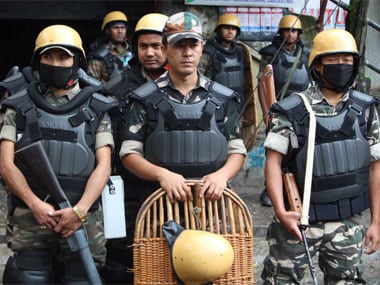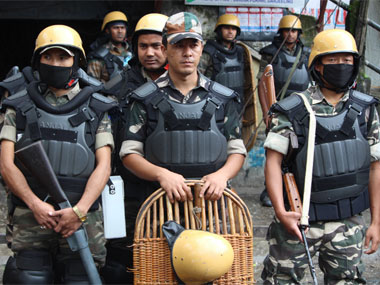Darjeeling, West Bengal: Their domicile certificate might say they belong to West Bengal but ask any Gorkha and they will tell you they don’t really feel like they belong to the state. “Racial slur is a common phenomenon in West Bengal. Sometimes, we are called ‘Chinki’, sometimes ‘Khukri terrorist’ and ‘outsider’ too,” Bipin Lama, a Gorkha youth studying in a reputed college in Kolkata told Firstpost. He said many Bengalis live in Darjeeling but he has never heard of them facing racial discrimination. “But for the Gorkhas, it’s a regular feature. They think what we can do in life is only to [sic] sell milk.”[caption id=“attachment_3827271” align=“alignleft” width=“380”]  High security at Chowk Baazar, Darjeeling. Image courtesy 101Reporters.com[/caption] In October last year, two law students from the Gorkha community, Akshay K Pradhan and Manik Sethi, had filed a petition in the Supreme Court regarding racial profiling of the Gorkhas. Their petition read: “Nepalis or Gorkhas are projected as witless and brainless people who are fit to stand only on others’ doorsteps. Such actions grossly violate the basic right of the Nepalis to live with self-respect and dignity. Racism and stereotyping against the Gorkha community wouldn’t stop without the intervention of the highest court in the nation.” Prakash Gurung, president of the youth wing of Gorkha Janmukti Morcha (GJM), which is spearheading the agitation for a separate state for their community, told Firstpost they often get branded as outsiders, foreigners and terrorists in West Bengal. He said the fact of the matter was that it was the Gorkhas who had inhabited Darjeeling in the 17th century when there was no boundary demarcation. A historical perspective In early 18th century, the Gorkhas ruled the then kingdom of Sikkim for 35 years and conquered Darjeeling and Siliguri, among other territories. History has it that between 1775 and 1815, about 1.8 lakh Nepalis migrated to the region and settled there. When the British arrived in the sub-continent to colonise it, they took control of Darjeeling and surrounding areas. Since then, authorities in Kolkata looked after their administration. The demand for Gorkhaland is more than a century old. In 1907, the Hillmen’s Association of Darjeeling urged the Minto-Morley Reforms Committee to provide a separate administrative set-up for the hills. Ten years later, the association submitted a memorandum in this regard again, this time to the secretary of the state of India Edwin Montague. The memorandum said: “Historically, culturally, ethnically, socially, religiously, and linguistically, there was no affinity whatsoever between Bengal and Darjeeling.” In 1929, Hillmen’s Association made this demand to the Simon Commission as well. Till the 80s, Gorkhas’ demand for a separate administration/autonomy was raised many a time. It was in 1986 that under the leadership of Subhash Ghisingh, Gorkha National Liberation Front (GNLF) launched a violent agitation for the separate state of Gorkhaland. The 28-month-long movement claimed the lives of 1,200 people. To placate the protesters, the West Bengal government formed a semi-autonomous administrative unit for Darjeeling and Kalimpong hills in 1988. It was named Darjeeling Gorkha Hill Council. In 2007, Bimal Gurung-led GJM launched fresh agitations for the creation of Gorkhaland. After three years of protests, the West Bengal government agreed to establish a new semi-autonomous body that would have administrative, executive and financial authority — but no legislative power — to administer Darjeeling and Kuresong districts. Thus, Gorkhaland Territorial Administration was formed in 2011 and replaced the Council. Stirring up the hornet’s nest This May, the West Bengal government announced that students of all the schools in the state will compulsorily have to learn Bangla till class 10. The Gorkhas felt slighted at the state’s bid to impose its language on them and took to the streets to protest the decision, which, they felt, undermined their language. While a fortnight later the government exempted Darjeeling schools from the mandate, its initial decision had already touched a raw nerve and sparked an agitation. Since then, the hills are on the boil. Tshiring Dahal, who had joined the GNLF as a student during the first Gorkhaland protests in 1986 and is now with the GJM, explained why the Gorkhas are adamant about a separate state. She said neither Bengalis recognise them as one of their own nor are they able to relate to Bengal despite 70 years of living there. She blamed it all on the state government’s “eternal disinterest in understanding or recognising our distinction.” The leader of the current agitation and founder-president of the GJM Bimal Gurung said via SMS that the struggle for Gorkhaland is for the political identity of the Gorkhas. On the run following a non-bailable arrest warrant issued in his name, he said the community is living under a colonial domination and wants liberation from West Bengal. M Yasin, retired professor of political science at North Bengal University, said the time has come to acknowledge the Gorkhas’ demand of their identity. “They deserve it. For over a century, they have been feeling deprived and exploited. It has only set in deeper into their minds,” he said. He explained that for the Gorkhas, their identity is not a mere notion but a feeling so intrinsic that it has become the driving force of their movement. “They may be powerless in front of the higher-ups in politics but the fact that ‘I am a Gorkha’ has let them sustain their efforts,” Yasin said. The author is a Guwahati based freelance writer and a member of 101Reporters.com, a pan-India network of grassroots reporters.
The leader of the current agitation and founder-president of the GJM Bimal Gurung said via SMS that the struggle for Gorkhaland is for the political identity of the Gorkhas.
Advertisement
End of Article


)




